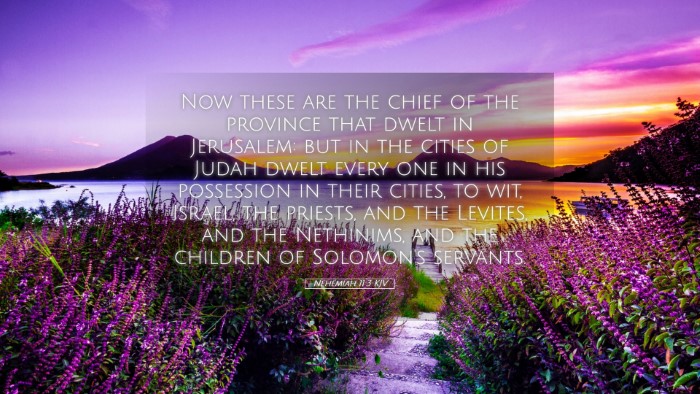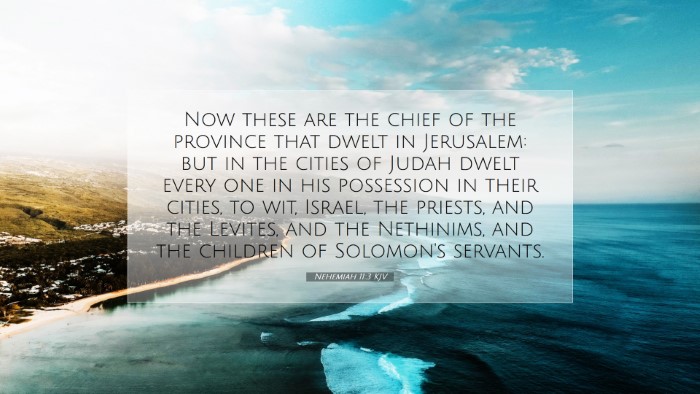Commentary on Nehemiah 11:3
Verse Context: Nehemiah 11:3 states, "And these are the chief of the province that dwelt in Jerusalem: but in the cities of Judah dwelt every one in his possession in their cities, to wit, Israel, the priests, and the Levites, and the Nethinims, and the children of Solomon's servants." This verse falls within a section where Nehemiah is organizing the population of Jerusalem after the return from Babylonian exile, highlighting those who resided in the city compared to those who lived in the surrounding towns.
Introduction
This commentary draws insights from the public domain writings of Matthew Henry, Albert Barnes, and Adam Clarke. Each of these theologians offers rich perspectives that deepen our understanding of this verse within its historical and theological context.
Historical Background
After the destruction of Jerusalem, the city lay desolate for many years. Upon the decree of Cyrus, the Israelites returned, spearheaded by leaders such as Zerubbabel and Ezra, followed later by Nehemiah. The re-establishment of the city was crucial for the national and religious identity of Israel. In this context, the population had to be organized, and those willing to inhabit Jerusalem needed to be identified and noted.
Insights from Matthew Henry
Divine Providence: Matthew Henry emphasizes God's providence in repopulating Jerusalem. He notes how the Lord moves people's hearts to fulfill His purposes. The verse underscores the reality that it’s through divine orchestration that the returning exiles settled back into the city.
Civic Duty: Henry observes that the heads of families and individuals willing to live in Jerusalem indicated a commitment to the city’s restoration. It was a significant act of sacrifice, as dwelling in the city often came with risks associated with its vulnerability.
Insights from Albert Barnes
Social Structure: Albert Barnes points out the mention of various groups: "Israel, the priests, and the Levites," highlighting the diverse social structure of the returning exiles. This detail illustrates the communal life of Jerusalem during the post-exilic period, with each group contributing to the city's spiritual and practical life.
Roles and Responsibilities: Barnes notes how the reestablishment of these roles was crucial for temple worship and community governance. The priests and Levites had significant responsibilities regarding worship and teaching the law, showing that spiritual leadership was central to the city's rejuvenation.
Insights from Adam Clarke
Religious Implications: Adam Clarke stresses the religious significance of the verse. He reflects on the importance of Jerusalem as the center of worship and the place where God's name dwells. The willingness of the Israelites to return is an indication of their renewal and dedication to serving God faithfully.
Family Legacy: Clarke also highlights that the return to Jerusalem was not merely a physical return but represented a restoration of family legacies and identities tied to the land. He notes that families settled in Jerusalem, connecting them to their ancestors and their covenant relationship with God.
Theological Themes
- Faithfulness to God’s Call: The choice made by those who returned reflects a profound act of faith. Their actions demonstrate a willingness to embrace God's call amid uncertainty.
- The Importance of Community: The verse emphasizes the need for community in fulfilling God’s plans. It highlights the importance of collective effort for spiritual and societal renewal.
- Reclaiming Heritage: The act of habitation symbolizes a reclaiming of spiritual and historical heritage that had been lost during the exile.
- God's Faithfulness: The presence of the priests, Levites, and others signifies God's commitment to His people, ensuring that worship and adherence to the law would continue.
Applications for Today
- Urban Ministry: Modern readers, particularly those in pastoral roles, can draw parallels with urban ministry, understanding the challenges and the call to serve in cities today, much like those who returned to Jerusalem.
- Community Engagement: The emphasis on community in Nehemiah invites contemporary believers to engage with their local church and neighborhoods, fostering a sense of belonging and collective mission.
- Covenantal Identity: Believers are reminded of their identity rooted in God’s covenant, urging them to live in a way that honors that legacy and brings glory to God.
Conclusion
Nehemiah 11:3 serves as a poignant reminder of God’s faithfulness and the call to rebuild not only physical spaces but also spiritual lives and communities. This verse encapsulates a moment of commitment, sacrifice, and renewal, offering profound insights for pastors, students, and scholars alike. Emphasizing the importance of community, identity, and faithful response to God's call, it remains a powerful expression of hope and restoration for God's people.


